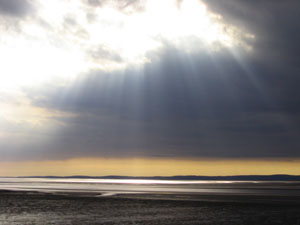Nineveh
Nicholas Michell
Approach the scene; doth not the heart appear
To hush its beatings, chilled with awe and fear?
Here lies a nation tombed! the great, the brave,
Crime, virtue, power, in one forgotten grave.
More low thou art, dead city! e'en than she,
Thy rival once in might and majesty,*
When Ind and Egypt heard thy trump of fame,
And isles of ocean trembled at thy name.
But Nature's aspect changes; dense and dun,
Clouds slowly rise, and veil the mid-day sun;
O'er Mosul's towers they deepen still their gloom,
Till heaven seems one vast pall, and earth a tomb.
Like arrows tipped with fire, the lightnings fly,
As launched by fiends across the angry sky;
While bursts their howl in yon deep thunder's roar,
Which rolls from Eastern hills to Tigris' shore,
Then like the wail of suffering and dismay,
O'er the far trackless desert dies away.
Meet is the hour thy dreary site to see,
City of darkness, vanished Nineveh!
To trace the mounds that mark the barren plain,
Where, veiled from view, tombed wonders yet remain.*
Yes, Ninus' palace, where all glories shone,
And rose at once his sepulchre and throne;*
Thy far-encircling walls, and thousand towers,
Baffling for ages Asia's leaguered powers;
The streets where princes drove their glittering cars,
And Traffic's sons were countless as the stars;
Arask's vast shrine, where that dread warrior died,
Whose banded myriads — boastful slaves of pride —
Fell in one night, when Heaven's own lightnings came,
And Death's pale angel waved her sword of flame,
Are now but heaps with rude wrecks scattered o'er,
That bear a language writ by man no more;
Where scarce the hermit wild-flower deigns to blow,
But coarse rank grass and plants of poison grow,
And jackalls lurk, and hooded serpents glide —
Monarchs ! approach ye here, and bow your pride!
Empires! so strong to-day, like change await!
And, laurelled conquerors! weep, and read your fate!
Author's notes:
Rival in Majesty: Babylon
Wonders yet remain: Travellers had long agreed that the once famous Nineveh ex tended over that desolate district which lies on the eastern bank of the Tigris, nearly opposite the modern town of Mosul. Its situation with regard to Babylon, the descriptions of Ptolemy and Herodotus, and the vast accumulation of remains, all favoured the opinions maintained by Niebubr, Rich, and Buckingham. The external ruins consist of a series of mounds, some covered with broken pot tery, tiles, bricks, and slabs of bitumen, and others clothed with coarse grass, tamarisks, and wormwood. The three highest of the mounds opposite Mosul have obtained the names of Tal Ninoa, Tal Hermoosh, and Nebbe Yunus.
Waved her sword of flame: The great temple of Arask rivalled in magnificence the shrine of Belus, at Babylon ; and here the renowned Sennacherib, after the destruction of a greater part of his army before Jerusalem, by the Destroying Angel, was assassinated by his two sons, B.C. 713.
